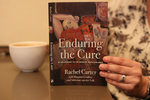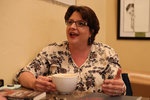

In 2000, Rachel Carter received news that would change her life forever, a diagnosis of multiple sclerosis.
“I started to cry,” Carter wrote in her book, “Enduring the Cure: My MS Journey to the Brink of Death and Back” about receiving her diagnosis. “I did not know what multiple sclerosis was, but it certainly sounded bad.”
Over the next 14 years, Carter would endure the most painful years of her life as MS took over every aspect of her being.
“I used to be very active,” she said. “I was a cheerleader in high school, ran marathons and rode motorcycles.”
Multiple sclerosis, or MS, is a potentially disabling autoimmune disease of the brain and spinal cord. MS causes the immune system to attack the protective sheath (myelin) that covers nerve fibers and causes communication problems between the brain and the rest of the body. According to the Mayo Clinic, fewer than 200,000 people are diagnosed with MS in the United States each year.
“MS affects every person differently,” Carter said. “Some people can go through life with it, others are extremely debilitated.”
For Carter, the diagnosis was tragic. The once active Carter began to need a walker to move, spent days in bed and experienced so much pain she “thought the only way out was death.”
“I had maddening pain all the time,” she said, explaining that every day her body would hurt and ache with pain she had never felt before.
Some days her skin would itch to the point it hurt.
“MS causes a miscommunication with the brain and every time there’s a broken connection, your nervous system interprets that as pain,” she said.
While in the final stages of progression for her MS (something Carter deems her “death bed”), Carter was picking up her child from school and ran into a parent who was also suffering from the debilitating disease. The parent told her of the “cure” or Hematopoietic Stem Cell Transplantation (HSCT).
HSCT is a stem cell transplant procedure that aims to reset the faulty immune system in sick individuals. In the operation, stem cells are taken from bone marrow or blood before chemotherapy wipes out the entire immune system for a “reset.” HSCT does not reverse the damage done by MS, but it halts any progression of symptoms.
Carter said HSCT took a lot of mental preparation as the procedure is extremely dangerous and can result in severe injury or death.
“I really had no other option,” she said about the procedure.
Carter said during the sessions of chemotherapy and blood transfusions she would go to her happy place, a trip spent to Paris, France, when she was younger, the only time she felt “really free.”
Throughout the HSCT treatment, Carter said she would have “black spots” in her memory and wouldn’t remember large portions of the process, a difficult reality for someone writing a book about her experience.
Because HSCT doesn’t reverse any symptoms, Carter still has trouble organizing her thoughts due to the brain damage caused by the disease.
“I had a hard time remembering things,” she said, later adding she was thankful for Margaret Godfrey and Adrienne van der Valk for helping her with the editing and writing process. “All the words are my own but I couldn’t have done it without them.”
For Carter, her book is for more than people struggling with MS. It’s for anyone who needs hope in the healing process for anything.
“It’s not a guidebook for anybody diagnosed MS,” she said. “I talk about the tips and tricks I used just to keep my mind from wanting to kill myself, what I did to not give up.”
“Hope is finding a way out and getting through it,” Carter concluded.
Her book can be purchased on Amazon or at enduringthecure.com.